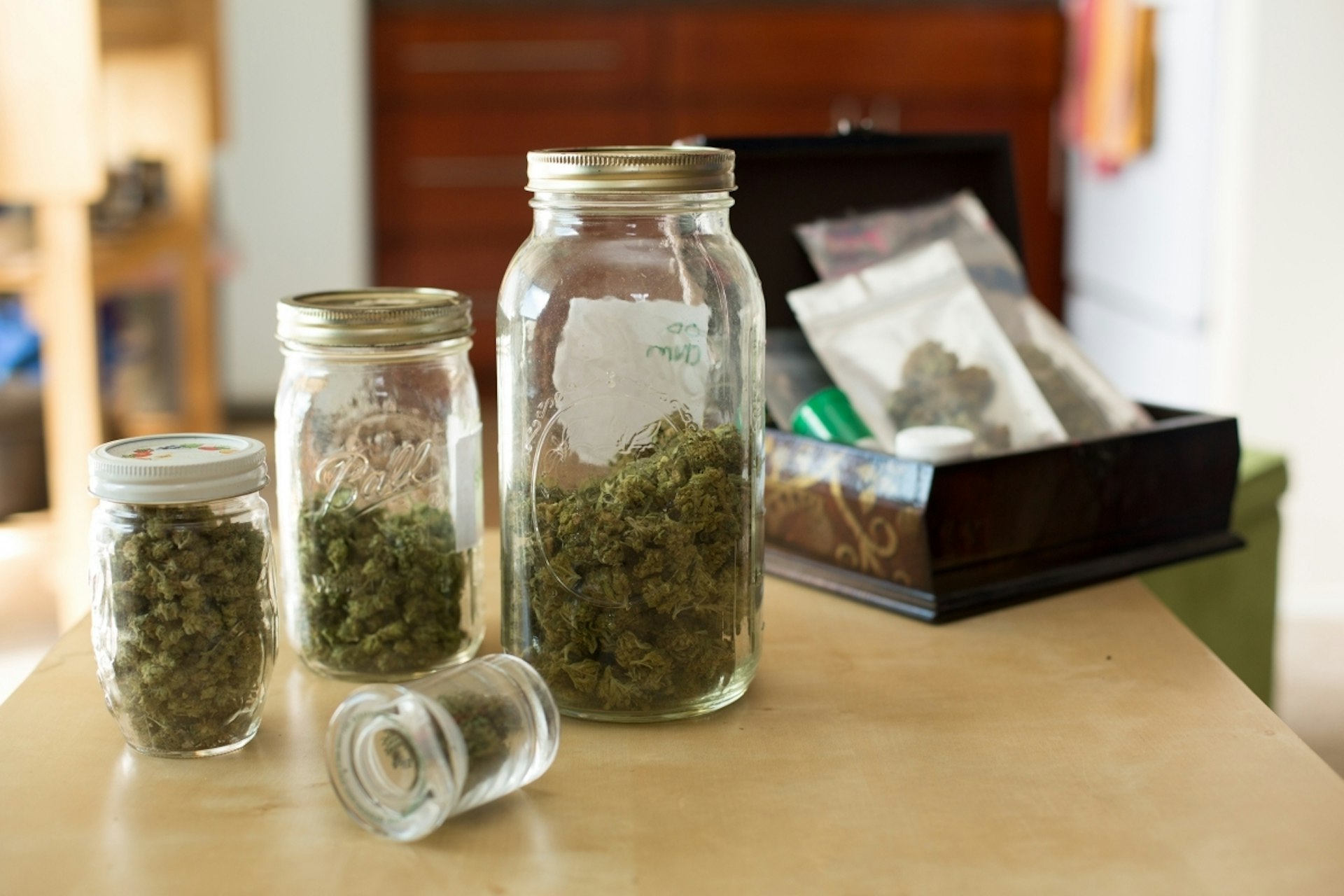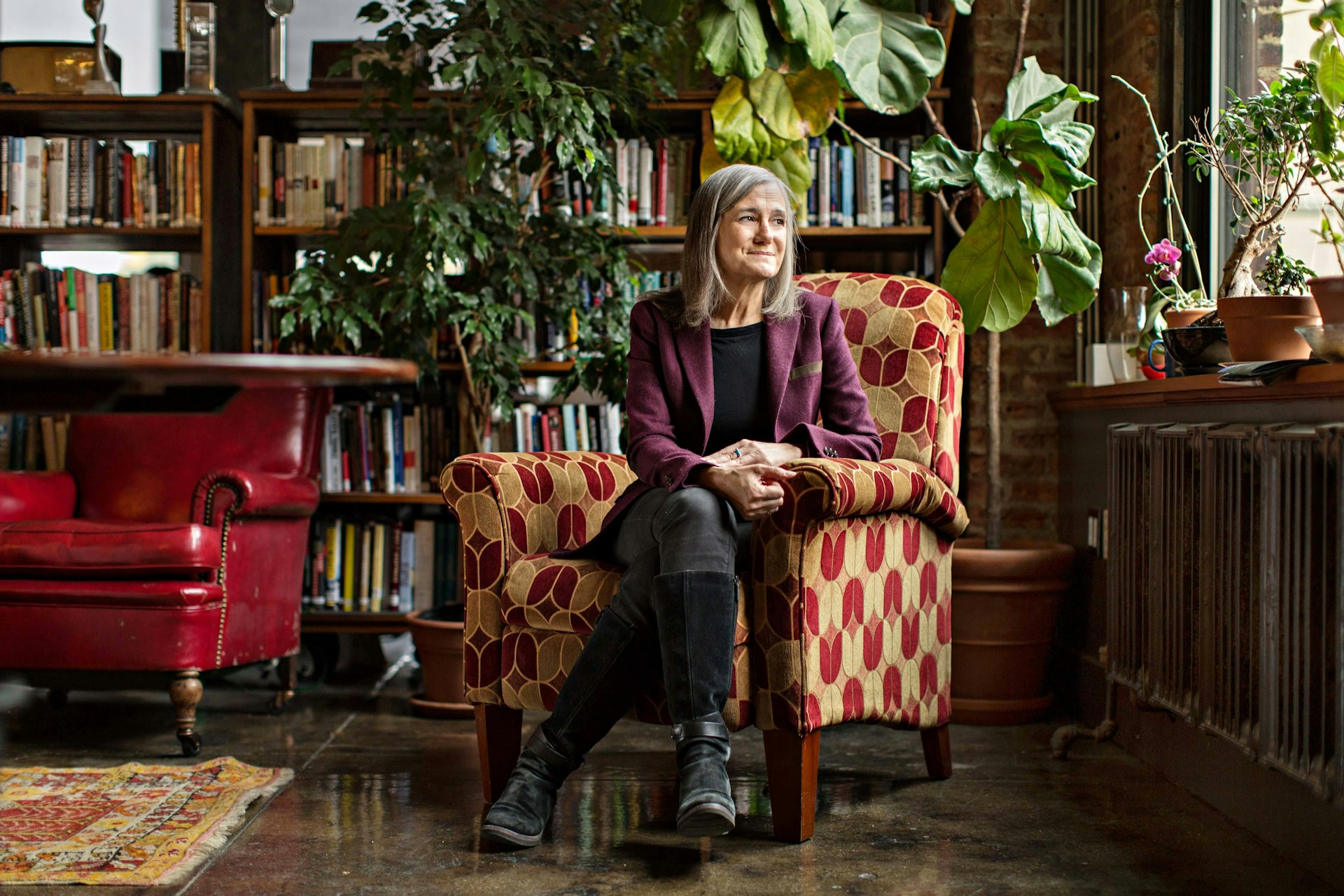
Amy Goodman's fierce brand of independent journalism
- Text by Andrea Kurland
- Photography by Dorothy Hong
Journalism’s ongoing state of crisis is still, scarily, in its infancy. As we flail around trying to figure out how to get heard – and paid – while publishing stories that matter, there’s always a beacon on the horizon when things fade to grey.
Democracy Now!, a last bastion of ‘proper’ journalism – a place you can rely on for its strong, independent stance – has become over recent years a reassuring patch of solid ground when the media at large starts swaying to corporate interests. Their tireless reporting chisels away at critical issues – from police brutality to the Israeli occupation – broaching stories that other outlets won’t touch.
And so it was earlier this month, when presenter Amy Goodman – unconquerable, fierce, and always first on the frontline – travelled to North Dakota to cover the Native American-led protests against the Dakota Access pipeline – a wholly impressive and vital direct action that, as we speak, is staking its claim as the largest, most diverse tribal action in recent history.
On September 3, Democracy Now! filmed police unleashing pepper spray and dogs on peaceful protestors. Amy Goodman’s report quickly went viral. Last week, a warrant was issued for her arrest.
“This is an unacceptable violation of freedom of the press,” said Goodman, who was charged with criminal trespassing. “I was doing my job by covering pipeline guards unleashing dogs and pepper spray on Native American protesters.”
News of the warrant brings two things into sharp focus: forces will always conspire to stymie the truth; and reporters like Goodman, in spite of journalism’s broader crisis, will refuse to let those forces win.
Last year, we had the pleasure of speaking to Amy about the roots of her unfettered commitment to reporting on injustice.
And so, in true Democracy Now! fashion, we’ve elected to bring you a transcript of that conversation – unabridged, unedited and straight from the source.
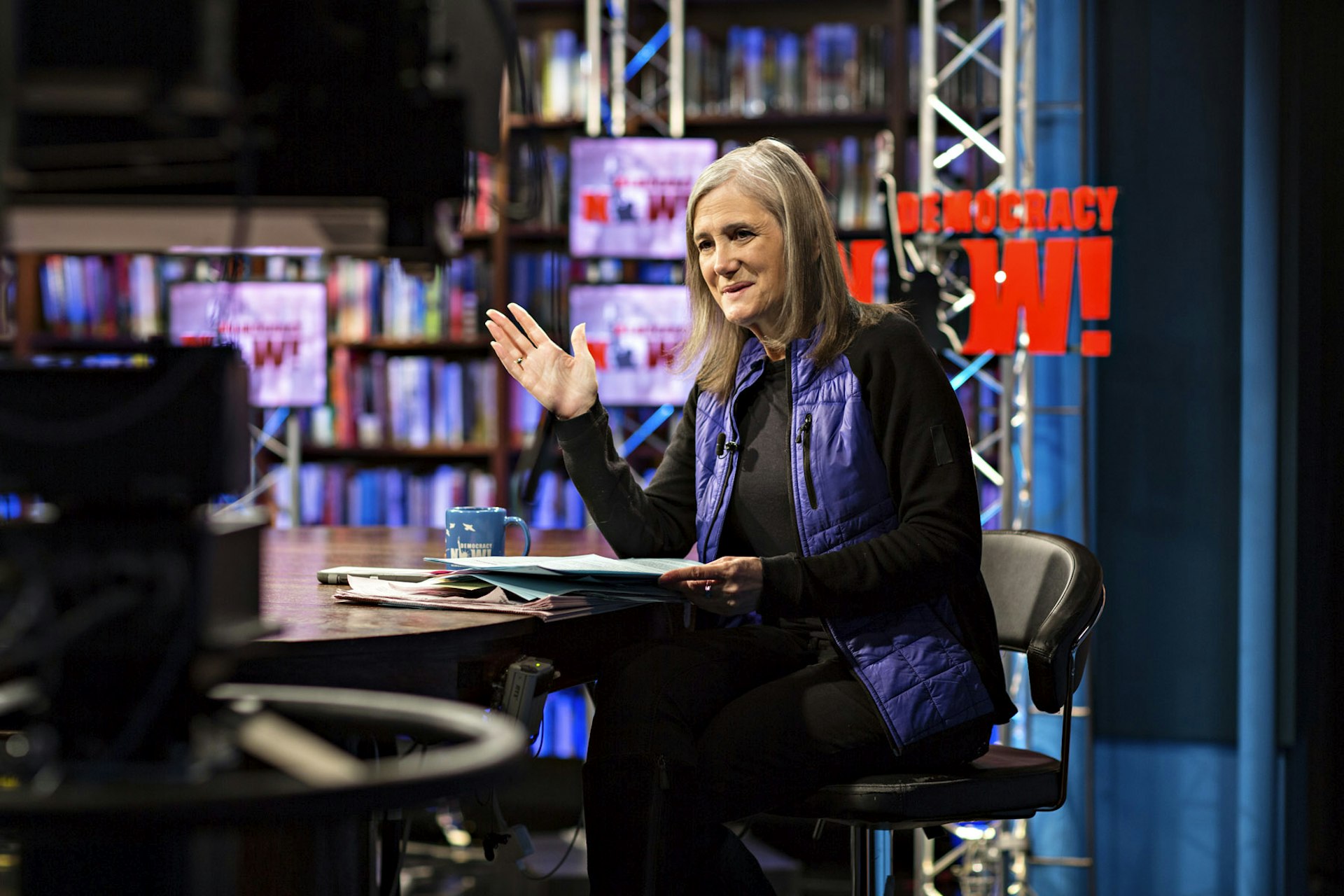
What first made you want to be a journalist? Was there anything that happened in your personal life that triggered your ambition or your social conscience in that way?
Well, ever since I was a kid I was involved in journalism, you know, in my high school and junior high school newspaper – are you recording this? Okay. So since I was a kid I was involved in journalism one way or another, in my high school, junior high-school newspaper.
My father was head of a task force in our neighbourhood in New York to integrate the schools. There were neighbourhood schools, and so even though we had a diverse community, there were railway tracks and people – you know, whites and blacks – would bunch up on the sides of the railroad tracks. And he lead a task force to integrate the schools. I was in fifth grade at the time, and I would go with him to the heights, to the auditoriums, to the cafeterias at the elementary schools – and there would be a thousand screaming parents with, you know, death threats and everything, attacking him. And he, very judiciously, guided our community to a more just place.
Journalism is a way that I deal with issues of social justice, making the world a better place, exposing those who abuse power, bringing out the voices of people who aren’t usually heard. You know, in high school we would write editorials demanding the principle do something. And now, it’s just going to a more global stage.
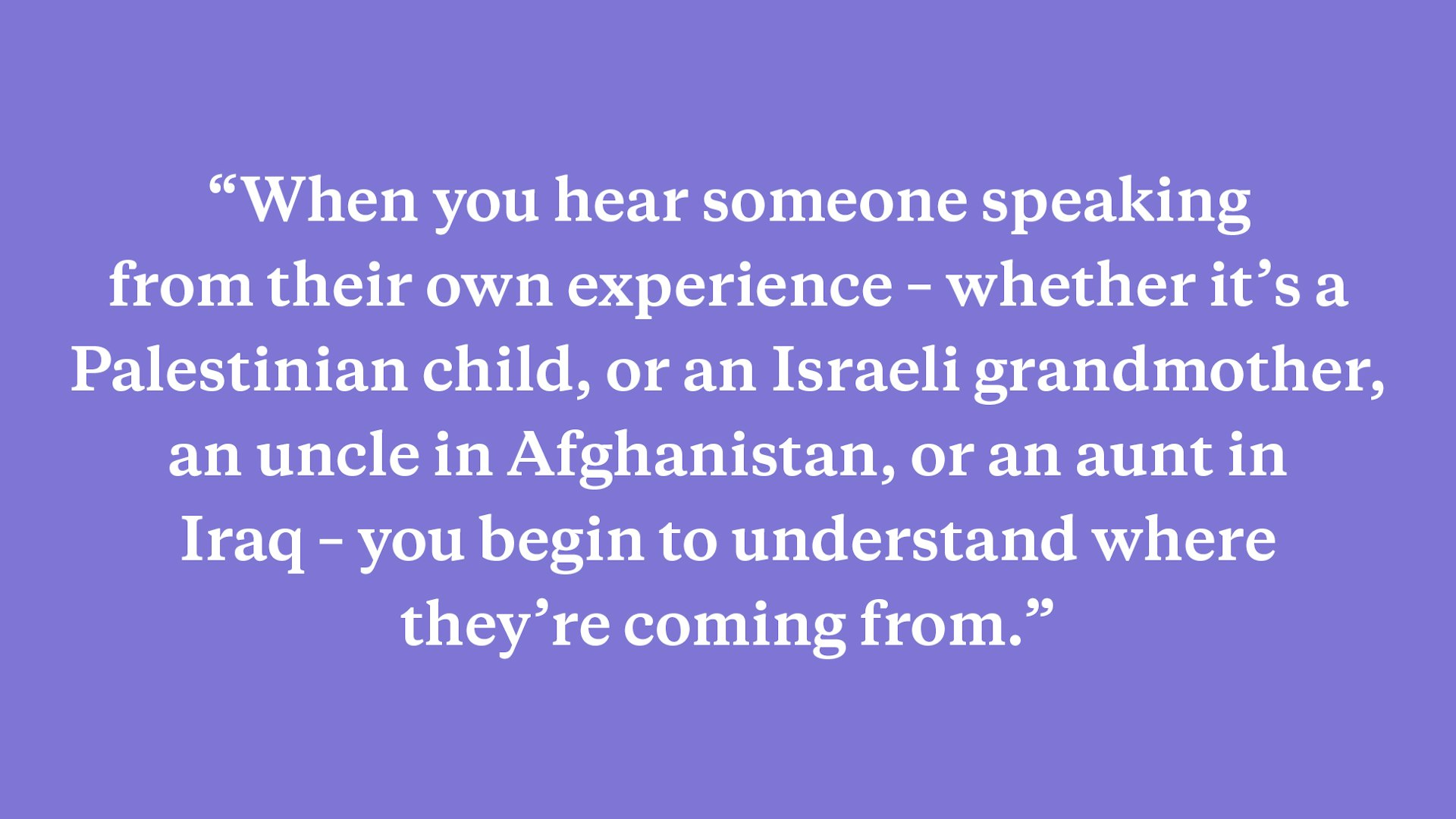
How did your career start and how did that merge with the founding of Democracy Now?
Well, I heard WBAI, the Pacifica Radio station in New York, when I graduated from college and came back home, and I was amazed by what I heard. To hear all of the grit, the beauty, the accents of New York, with no corporate agenda. Just to hear what actually was happening, people speaking for themselves. I originally come from Pacifica Radio, which was founded more than 65 years ago in Berkeley, California, by a man who was a war resister. And when he came out of these detention camps after World War Two – his name was Lewis Hill – he said there’s got to be a media outlet that’s not run by corporate profit from war, that’s run by journalists and artists. And George Gerbner, the founder of the cultural environment movement said: “Not run by corporations that have nothing to tell, and everything to sell, that are raising our children today.” And so Pacifica was born.
The first station was KPFA in Berkeley, then a station in Los Angeles, my station WBAI in New York, a station in Washington DC, the nation’s capital. And in 1970 KPFT in Houston went on the air. And the reason I tell you about this station is because it’s the only radio station in the United States that was blown up. It was blown up by the Ku Klux Klan. They went on the air in the spring of 1970, and within weeks the Klan strapped dynamite to the base of the transmitter and blew it to smithereens. When they got back on their feet and rebuilt the transmitter, they blew it up again. And I don’t know exactly who it was, but it was the Ku Klux Klan – that white supremacist or imitation. I don’t know if it was the Grand Dragon, or the Exalted Cyclops, because I often confuse their titles, but he said it was his proudest act. And I think that’s because he understood how dangerous Pacifica is, how dangerous independent media is. Dangerous because it allows people to speak for themselves.
And when you hear someone speaking from their own experience – whether it’s a Palestinian child, or an Israeli grandmother, an uncle in Afghanistan, or an aunt it in Iraq – you begin to understand where they’re coming from. I think they agree with it you know, how often do we agree with our family members? But you understand why they believe what they do. That’s the beginning of peace. I think the media can be the greatest force for peace on earth. Instead it is wielded as a weapon of war. And that’s what we have to challenge. That’s what we have to change.
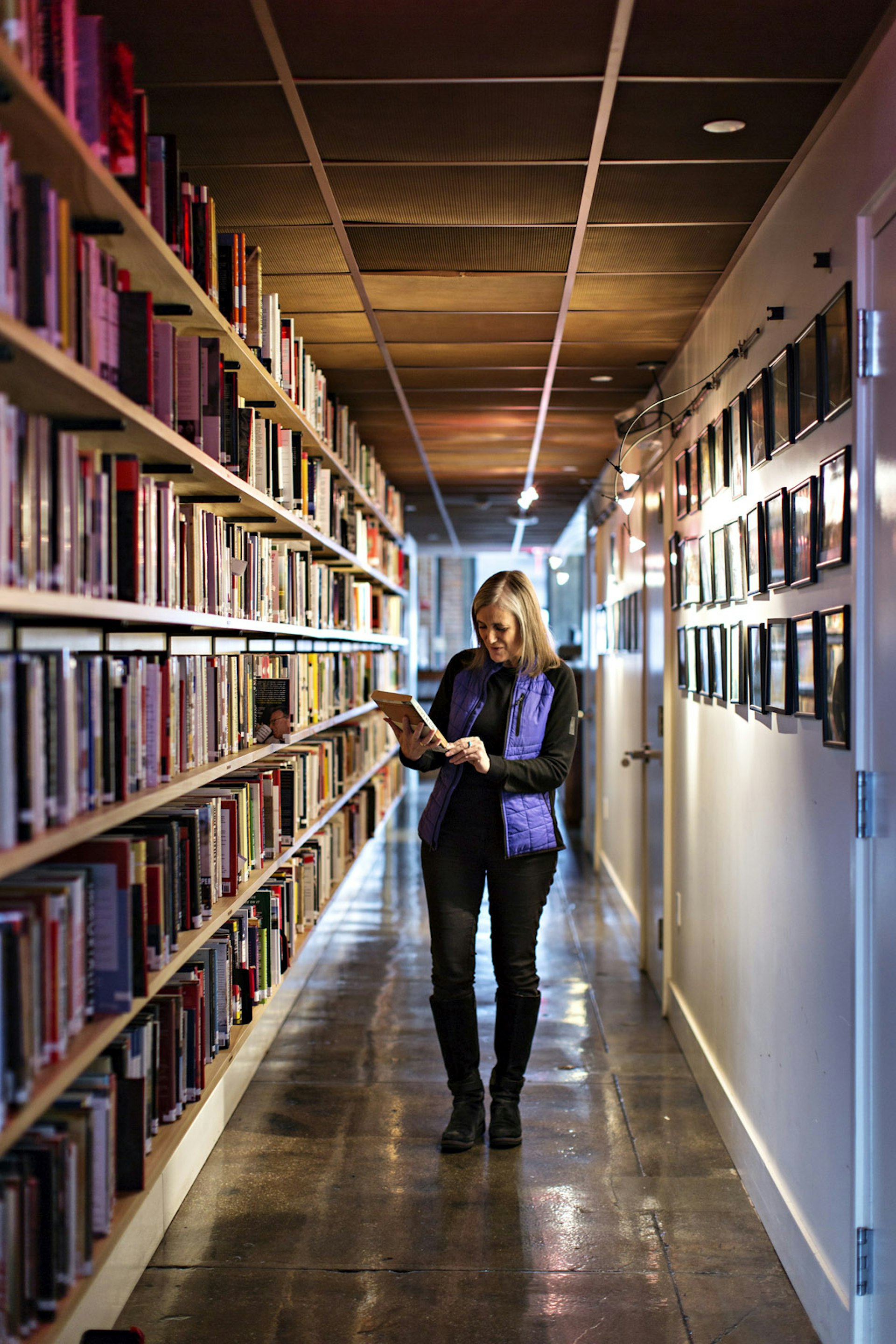
Over the course of your career, especially in the early days, was there a particular assignment where you heard a story from the grassroots that still resonates with you today, or that was a really formative experience?
There are many experiences. I am transformed every day when I hear someone speaking from their own experience. You know, the reason the Klan can’t tolerate independent media is because, when you hear someone speaking for themselves, it breaks down caricatures and stereotypes that fuel hatreds, that divide us. But I think about 1991 in East Timor, a tiny island about 300 miles above Australia. I had already been there once, the year before, with another journalist Allan Nairn. This is a small island nation, East Timor, that was occupied by Portugal for many years. And then in 1975 Indonesia invaded East Timor – Indonesia had the fourth largest army in the world. And they wanted to add it to their, you know, 13,000 island archipelago.
And on December 7 1975, the Indonesian military invaded East Timor by land, by air, and by sea. They closed off the country and they started the genocide against the people of Timor. That was in ’75. In 1990 and ’91, I got the chance to go to East Timor with journalist Allan Nairn. We arrived at the end of October, 1991, and we immediately went to the Catholic church in Dili, the capital of Timor, and the women were wailing. And I didn’t know if it was just common, the sorrow of Timor, or if they were crying about something in particular. And after the mass we learned the Indonesian military had surrounded the church the night before and killed a young man inside, called Sebastian Gomez.
We saw blood on the steps. And the reason he was in the church with so many young people was they’d taken refuge there. Because, you know, Indonesia’s invasion and occupation of East Timor led to a third of the population killed. And in 1991, the UN was sending an independent delegation to investigate the human rights situation for the first time, so many young had taken refuge in the churches because they were afraid they would be arrested if the militia knew they were going to speak to this UN delegation.
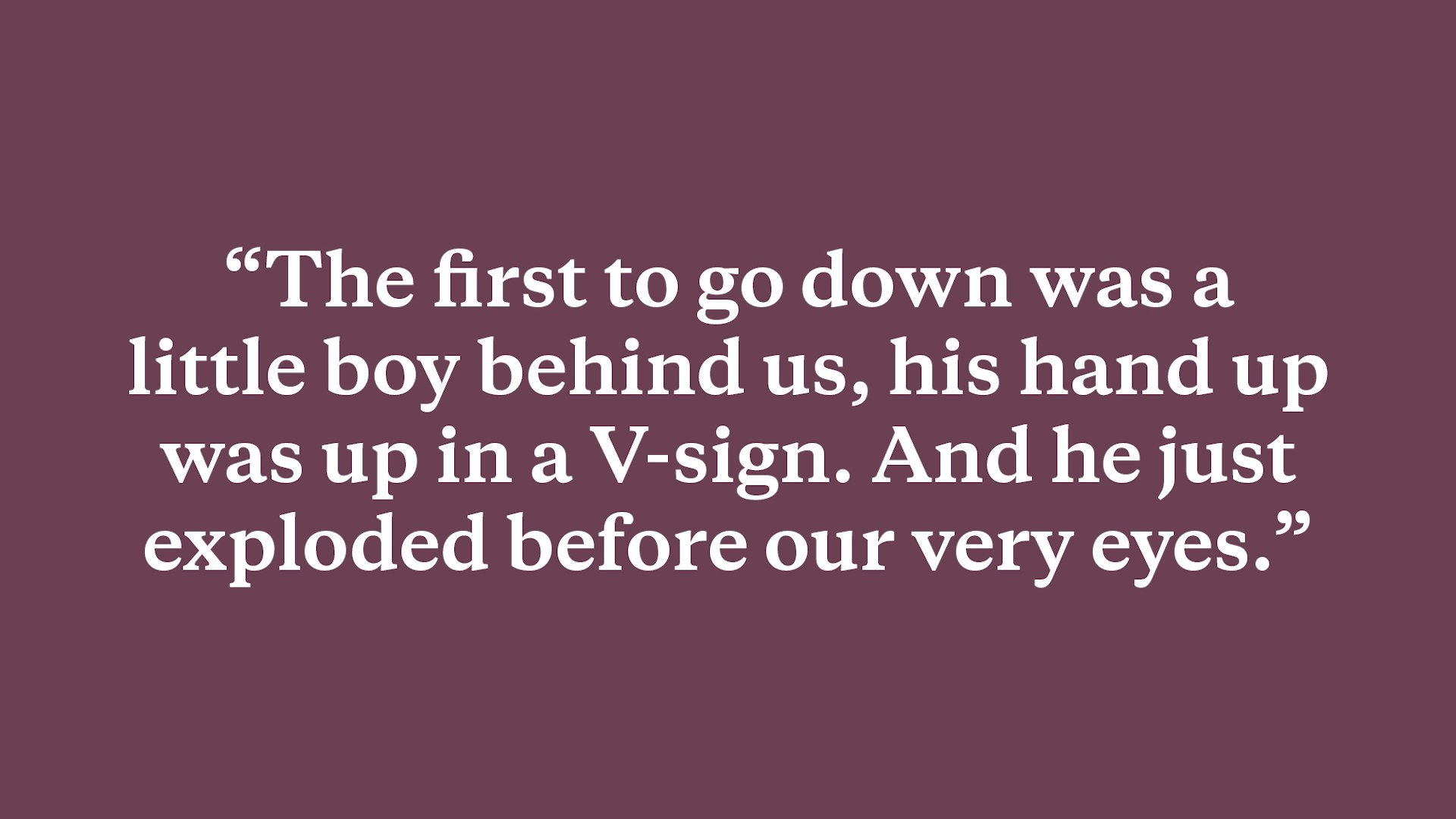
So we went around the country, and everywhere we heard the same story – the Indonesian military threatened the people and said if you speak to the delegation we’ll kill your family to the 7th generation. A nationwide death threat had been issued. We went around the country everywhere and then the morning of November 12, 1991, it was two weeks after a procession had been held for the funeral of Sebastian Gomez. And now thousands of people filled the streets and retraced the steps of the funeral to the cemetery. The Indonesian military started to move in on the protestors.
Allan and I were in the middle of the crowd asking people, “Why are you risking your lives?” and they would say “For my mother”, “For my father”, “For my village, it was wiped out.” When we saw the soldiers coming up the road, ten to to twelve abreast, their US M16’s held at the ready position, we walked to the front of the crowd. We knew that the military had killed other journalists in the past, but – we knew the military had rather committed many massacres in the past, but never in front of Western journalists. So we thought our presence could head off the attack.
We walked to the front of the crowd, I held up my microphone, Allan put the camera above his head, people behind us could not escape on either side of the road, and the soldiers marched, they swept around the corner, swept past us and they opened fire on the crowd, gunning people down from right to left. The first to go down was a little boy behind us, his hand up was up in a V-sign. And he just exploded before our very eyes. The soldiers kept shooting. They surrounded us, they stood in a firing squad fashion. They forced us to the ground. They stripped us of everything. They shouted, “Australia”, they were asking if we were from Australia. And they shouted “politique” accusing us of being political, for witnessing the massacre. When they first came around the corner they took my microphone, waving it around in my face as if to say, ‘this is what we don’t want’. They beat me to the ground.
Allan had taken a photograph of them taking fire. He threw himself on top of me to protect me. And they used their US M16s like baseball bats. They slammed them against his skull until they fractured his skull. So we were laying on the ground. They lined up the firing squad with the guns pointing at our heads shouting, “Australian politique” and I shouted back, “We’re from America”. And they’re like, you know, they would kick me in my stomach. When I got my wind back, I would say “America”. I thought it was important for them to know that we were from the same country their weapons were from. They would have to pay a price for killing us, that they had never had to pay for killing the Timorese.
At some point the soldiers took the guns from our heads, and they just kept shooting. We were able to get into a Red Cross vehicle that had pulled up. The driver got out and picked up an old man next to us who they had dragged to a ditch, and every time he picked up his hands in a prayer sign they would take the butts of their rifles, and they’d smash his face. She picked him up, put him in the vehicle. We drove off like that. Timorese jumped on the top of the vehicle, along the side. We drove as a human mask to the hospital. When we got there, the doctors and nurses started to cry when they saw us – not because we were in the worst shape – I mean, Timorese were being dragged in who were shot, who they were operating on.
But I think because of how they see United States and how they see the West – they see it in two ways: as a sword and as a shield. You know the US so often, Britain as well, provides weapons to human rights abusing regimes, or uses them themselves, like in places like Afghanistan and Iraq. But that’s the government. That’s the ‘sword’. They also see us as the ‘shield’ – the American people, the British people. And on that day, they saw that shield bloodied. And it just deepened their despair.
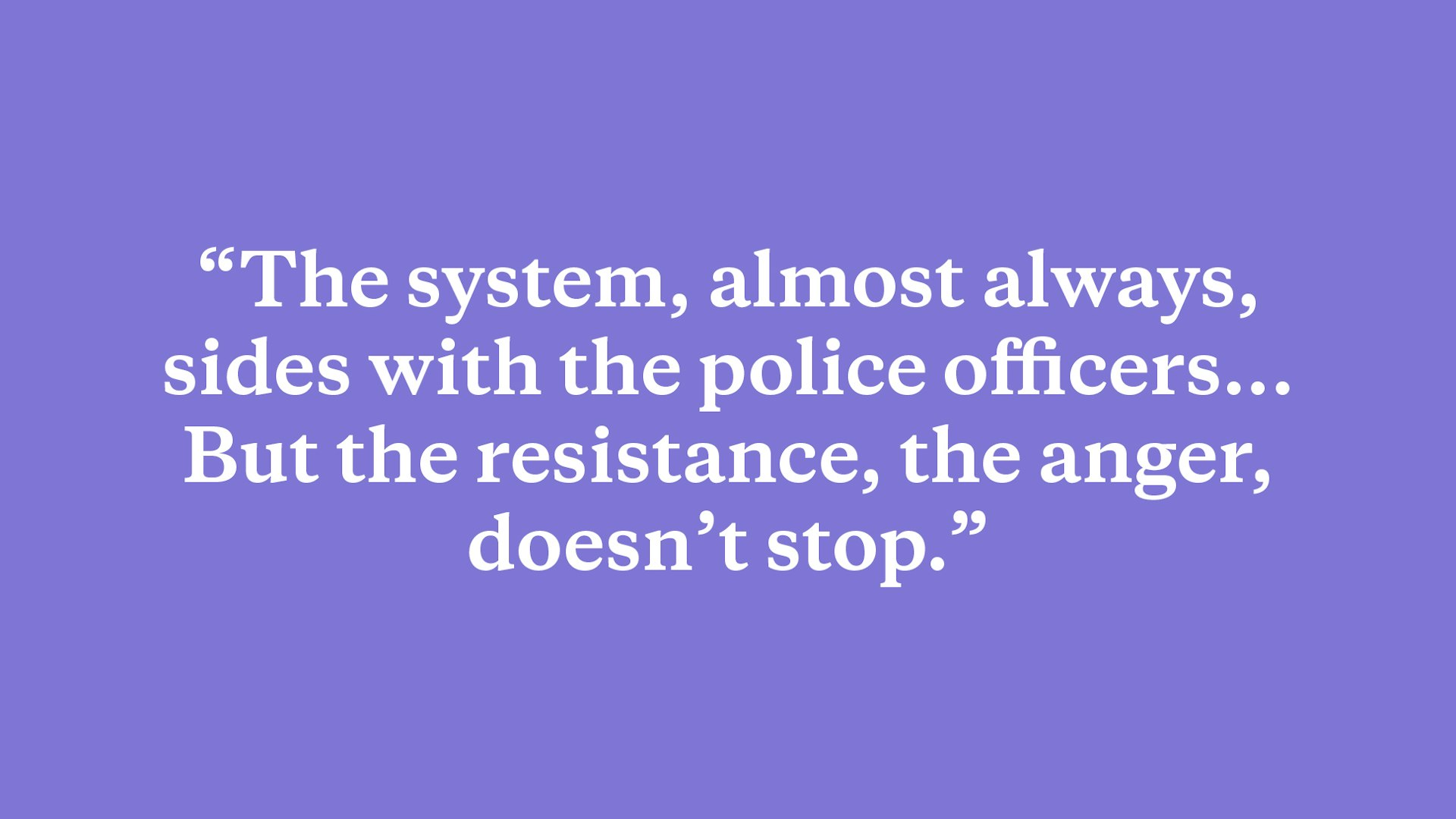
We‘d gotten out of the hospital. We knew the Indonesian military would raid that hospital because that’s where the survivors were being brought. The Indonesian military that day killed more than 250 Timorese. We were able to get to a plane, the only plane out that day. We flew out of the country to the United States. In Washington we held a news conference with the National Press Club, after Allan came out of the hospital – his head having to be sewn up. And we told the story of what Indonesia had done. They denied that they had committed a massacre. But there were Western eye witnesses. And after that in the United States, a human rights group grew up the next year, called the East Timor Action Network.
In Britain I think polls were done showing that when – there was another Western journalist who was there from Yorkshire TV, named Max Stahl. He was inside the cemetery. And when the Indonesian military started opening fire, he started filming as the people ran through the cemetery, the young people – these are 16, 17, 18-year-old kids. And he was burying his videotape in a fresh grave as he was arrested. But later that night when he got out, he dug up that videotape and he got the video out. And it aired in Japan, I think, in Britain. And in Britain when people were asked what issue they wanted to see more of, the answer was ‘East Timor’ and ‘Why is the US and Britain arming the Indonesian regime’?
And that made all the difference. These humans rights groups all around the world putting pressure on the Indonesian military. So we were banned from returning to Indonesia. We would have to go through Indonesia to get to Timor. But in 1999, the people of East Timor voted for their freedom in a UN sponsored referendum. In 2002, after three years of UN rule, East Timor became an independent nation – one of the newest nations in the world. And we were able to go and cover that celebration. And it was an amazing moment.
It was May 2002; 100,000 Timorese gathered for their first independence day. Kofi Annan, then the UN Secretary General gave a speech, all world dignitaries were there. And then Xanana Gusmão, the rebel leader of East Timor who’d been imprisoned by the Indonesians for years, who became the first president of an independent East Timor in years, got up, speaking in many different languages. He unfurled the flag of the Democratic Republic of East Timor. There was a fireworks display, and you could see the light reflected in the tear-stained people of East Timor. They had resisted and they had won. At an unbelievably high price – a third of their population was killed, 200,000 people. This nation of survivors had prevailed. And it was a lesson – they also thanked all of us, in the West, people who had pressured their governments to stop arming human rights abusing regimes.
And that is a lesson to all of us – whether we’re journalists, or students, artists, teachers, employed or unemployed. We have a decision to make every day – whether we want to represent the sword, or the shield.
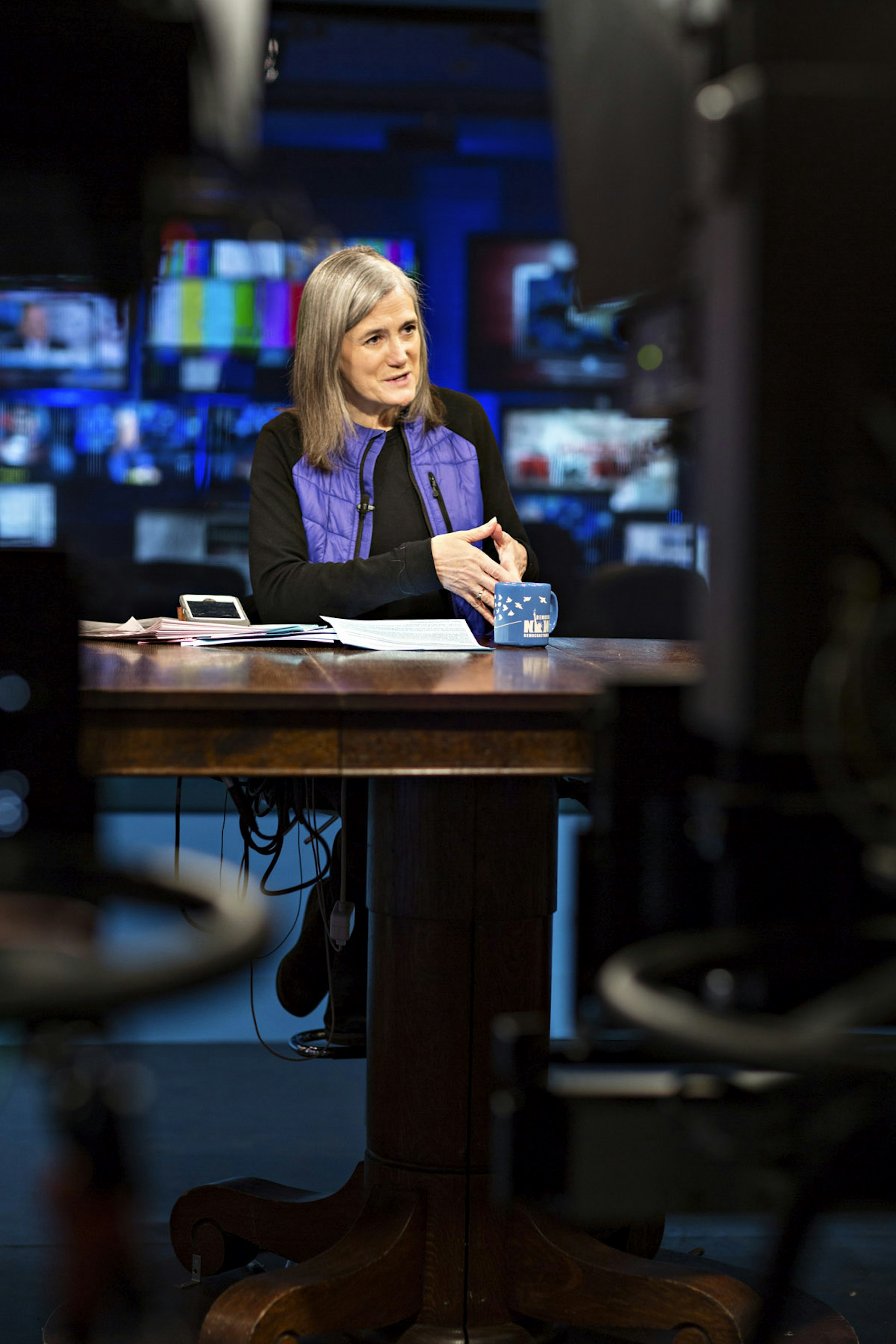
And when you’re faced with stories like this, first-hand and through the people that you meet and interview, stories and situations that are the cause of great pain and also great frustration, what is it that you feel? Are you driven by frustration, or is it something else?
I am very inspired when people stand up, believing that they can change a terrible situation. I mean, whether we’re talking about the people of Timor, or the streets of Ferguson in the United States in Missouri where Mike Brown was gunned down in August – a young, African-American man unarmed, killed by a police officer. I mean, the resistance, the uprising that has taken place as a result of that day after day, from the boiling hot August days to the freezing cold days of winter in Missouri – especially the young people – but the whole community had demanded justice.
Now ultimately, as is often the case in the United States, whether Mike Brown in Ferguson, Missouri, or Eric Garner closer to home to me here in New York, an African-American grandfather who was taken down in a choke-hold by police. A completely innocent man. And this was videotaped. And as he shouted 11 times “I can’t breathe” they took him down to the ground, and he died. They prevented bystanders from helping him. In both cases the officers who did this – Daniel Pantaleo in Staten Island, Darren Wilson in Ferguson – were not indicted. Because the system, almost always, sides with the police officers. You know, the courts work so closely with the police officers. But the resistance, the anger, doesn’t stop. And that is uniting people across the United State, and across the political spectrum.
The Justice Department in Washington recently issued a report, a scathing report, exposing the racism of the Ferguson Police Department, demanding that there be change. But the most significant response has been the response of the people. The whole Black Lives Matter movement. And that’s what inspires me – when people organise. You know the anthropologist Margaret Mead said, “Never doubt for a moment that a small group of thoughtful, committed people can change the world. Indeed, it’s the only thing that ever has.” This is not a small group of people. This is people uniting in their communities, all over the country. And in fact, all over the world. Whether we’re talking about police brutality in the United States, or the whole climate change movement – global warming, you know, climate chaos.
We flew from Ferguson, to Staten Island, to the protests. And then we had to go down to Lima, Peru, for the UN climate summit, where we bring out the voices of people from around the world who gathered, deeply concerned about this threat to the climate. And one of the first protests we saw in Lima was of young people. They were laying on the ground, and what were they chanting? They were chanting, “I can’t breathe, I can’t breathe”. That’s what Eric Garner said as he was being killed by the police. And they were making that connection between police brutality and the abuse by authorities of citizens, with climate change. You know, the whole idea of a fossil fuel-polluted world, ‘I can’t breathe’. It’s those connections – whether we’re talking about climate chaos, police brutality, or the war now in Iraq, in Afghanistan, in Yemen, in Syria, Lebanon. This never-ending war that people, including soldiers, are speaking out against. It’s that kind of organising that so inspires me.
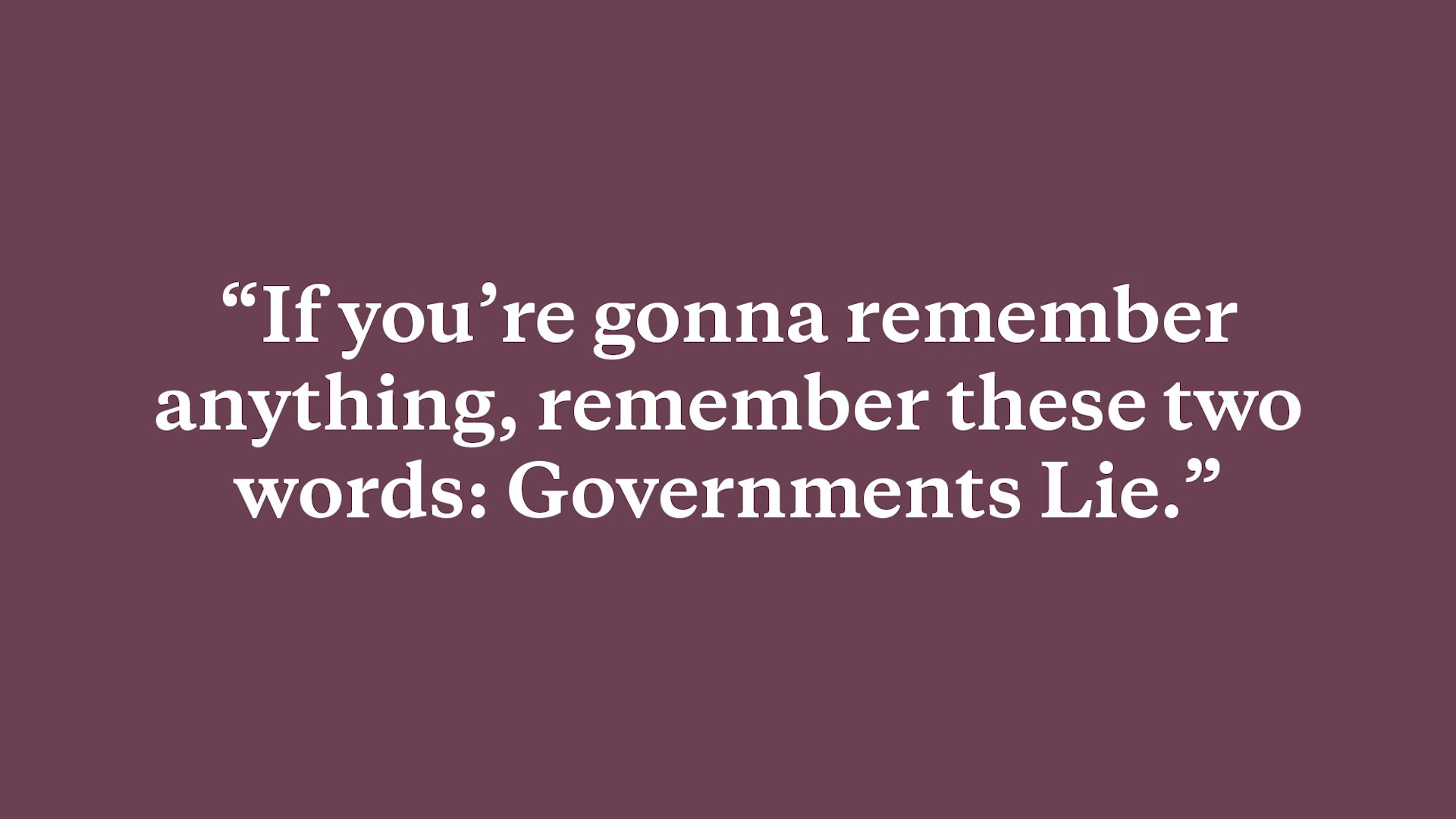
What message would you have for a young person who is maybe just starting to question the corporate media paradigm, or the information that they’re being presented with? Where should they look if they’re just starting to become curious that they might not be getting the full truth?
Well first of all: question authority. I mean, that is the basic tenant of any journalist. There’s a great American journalist called I.F. Stone, Izzy Stone. In teaching journalism students he said, “If you’re gonna remember anything, remember these two words: Governments Lie.” That’s very important. And I think especially young people tend to question authority, and so journalism is such an important way to do that. We have to hold those in power accountable.
My brother, also a journalist, David Goodman and I have written a couple of books together. Our first book was called The Exception to the Rulers exposing oily politicians, war profiteers, and the media that loved them. But that line, ‘exception to the rulers’ – that’s what all journalists should be – the exception to the rulers. And our second book is called Static. And the reason we called it that is, even in the high-tech digital age, with high-definition television and digital radio, still all we get it is static. That veil of distortion, and lies, and misrepresentation, that half-truth that obscures reality. When what we need the media to give us is the dictionary definition of ‘static’ – criticism, opposition, unwanted interference. We need a media that covers power, not covers for power. We need a media that is the 4th estate, not for the state. And we need a media that covers the movements that create static and make history.
That is what I would say to young people. That independent journalism is a way we can help to right the world, you know, in both senses, ‘r-i-g-h-t’ and write about the world. We just came from Selma, Alabama, which was the 50th anniversary of March 7th of Bloody Sunday when 600 people marched over the Edmund Pettus Bridge fifty years ago for voting rights. For African-Americans to be able to vote. The Edmund Pettus bridge named after the senator was also the Grand Dragon of the Ku Klux Klan and a confederate soldier in the civil war, still named for him today. Six hundred people marched over that bridge 50 years ago, led by a 25-year-old named John Lewis, who’s now a Congressman. And the Alabama state troopers beat them as they came over the bridge. But that led to the growth of a mass movement for voting rights for African-Americans in this country.
Fifty years later when we went there this past March 7th, 100,000 people came and marched over that bridge, making the links between history. What happened 50 years ago, whether we’re talking about the voting rights, or the anti-Vietnam war movement, and the Black Lives Matter movement, or the anti-war movement today. And that’s what’s hopeful, is that these movements build on each other. And we need a media that expresses the sentiment of people at the grassroots, that doesn’t just give us that small circle of pundits you get on television, who know so little about so much, explaining the world to us and getting it so wrong. We need a media that brings us reality on the ground, and lets people speak for themselves.
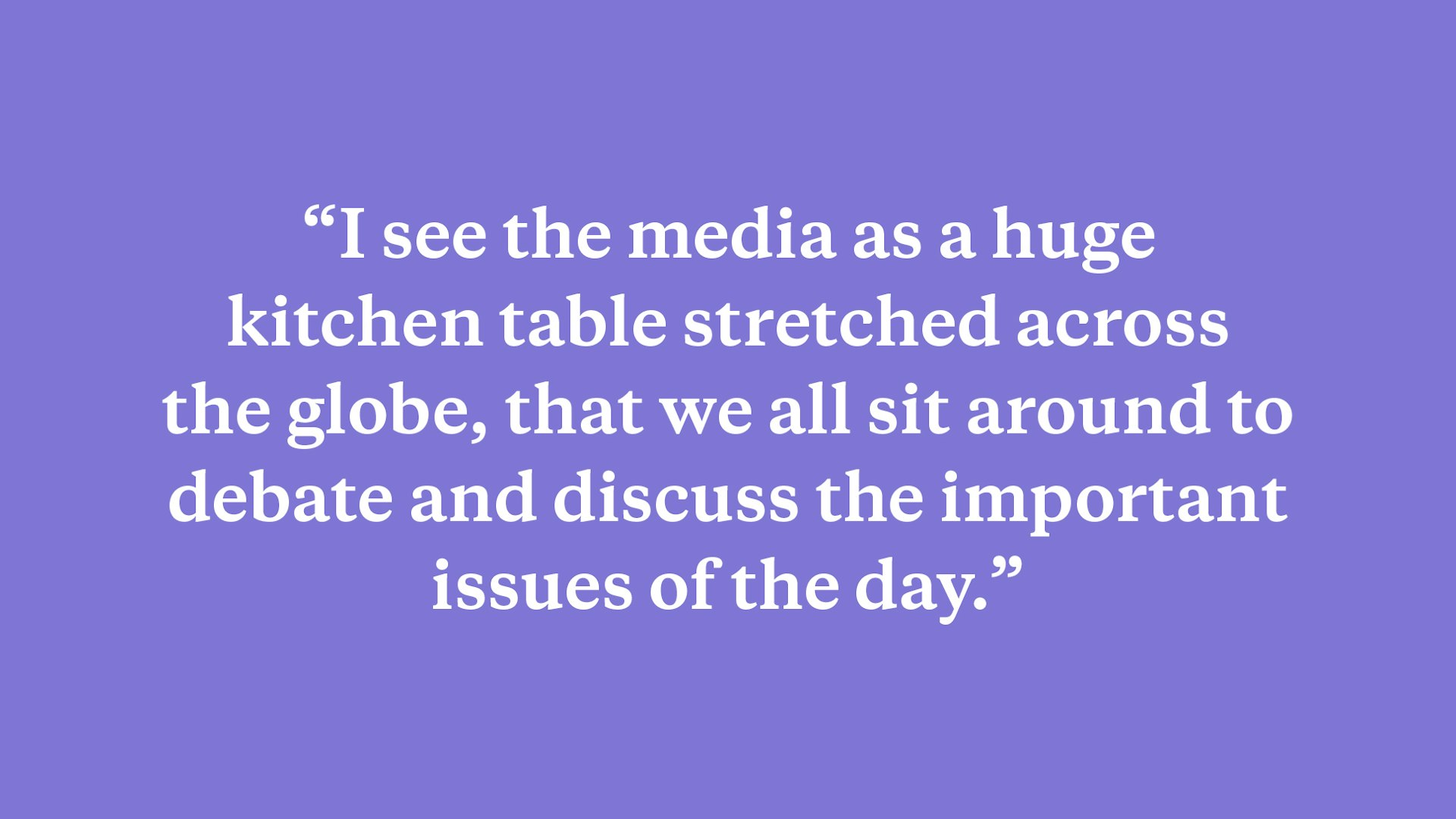
Do you feel frustrated at the thought that independent media, like Democracy Now!, though large and widespread and growing, will never have the same reach as corporate media? And how do you keep motivated faced with that fact?
Well, Democracy Now! is larger than many corporate media television programmes. Than many, than most of them. It wasn’t always like that. Nineteen years ago when we began, we were a nine-community radio station. And the next year we went down, we lost a community radio station in Pennsylvania, a network of stations. Because we dared to air the voice of Mumia Abu-Jamal, who at the time was on death row. The African-American journalist in Pennsylvania who in an extremely racist trial was sentenced to death for killing a police officer – a murder which he says he did not commit.
That was then. But in the week of September 11, 2001, we started on our first television station in New York. It was a public access station. And from that point we started to grow geometrically. I mean, stations all over the country. We became emergency broadcasting after the 9/11 attacks. And stations would say, can we run this show? And by popular demand, you know? Not because an advertiser wanted the show on, but because the community wanted the show on. Soon the postal service was coming with garbage bags, we would give them garbage bags, filled with video cassettes – at the time it was video cassettes. Because I thought it was breaking news so people had to have that news right away. And the stations started taking us.
When we would go on a TV station, the radio station in town would say, ‘Can we run you?’ And then the PBS station, the public broadcaster would say, ‘Can we run you?’. Nineteen years later, we are broadcasting in over 1,300 public radio and television stations around the world. From Sweden to South Africa, from Japan to Argentina and throughout the United States. Our headlines translated into Spanish as well. And on democracynow.org billions of people access our website. So at this point we are larger than many of the television shows that are sponsored by the weapons manufacturers and the oil, gas and coal companies. So I deeply believe that demonstrates the hunger for independent voices.
You know we need a media, when we cover war, that’s not brought to us by the weapons manufacturers. When we cover climate chaos, when we cover global warming, that’s not brought to us by the oil, the gas, the coal, the nuclear companies. When we cover healthcare – that’s not brought to us by the insurance industry, or the pharmacies. We need a media that is brought to us by listeners, viewers and readers – that’s independent. That’s what Democracy Now! is doing, and that’s why, I think right now, it has such a broad reach. So I have great faith in independent media.
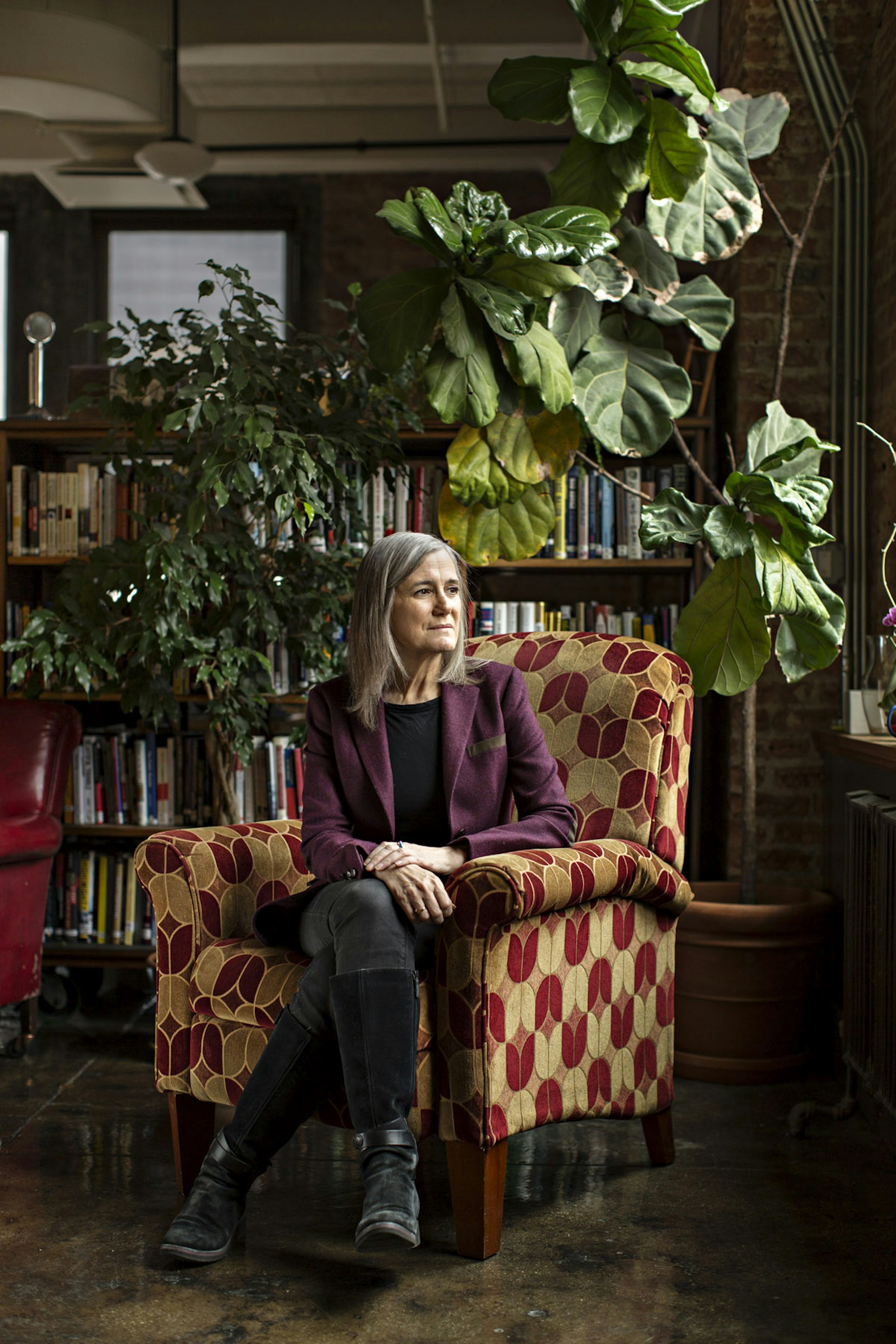
And on a personal level, do you feel that you’ve changed as a person through your work and through the stories that you’ve become so involved in reporting on?
I change every day. I am so deeply affected by the people that I cover. And, you know, when I’m sitting at a table speaking to someone, I feel guilty personally alone, that other can’t hear the person speak. And that’s the power of media. You know, I see the media as a huge kitchen table stretched across the globe, that we all sit around to debate and discuss the important issues of the day, like war and peace, life and death. And anything less than that is a disservice to a democratic society.
I mean just this weekend I just flew back from Detroit. And I see change everywhere. Just getting in the plane from Detroit to New York on Sunday, I looked in the cockpit of the plane and there were two pilots – both of them women. That is highly unusual.
In Detroit I met with, I sat next to and talked with Grace Lee Boggs. She is going to turn 100 years old on June 27. She is a Chinese–American activist who worked with Malcolm X and Martin Luther King, who deeply believes in grassroots activism, and how justice must be practised on the ground in all of our communities. And before that I was in Ann Arbor, Michigan, for the 50th anniversary of the first anti-Vietnam war teaching. It happened at the University of Michigan, where teachers and students decided, ‘what is the role of a university in a time of war?’ And they decided that the answer was education, was in teaching. They would go to school during the day and they would teach in through the night. And anyone in the community could come and learn about what was happening in the war. That was 1965. So I am deeply inspired every day. I am changed by the people that I speak to, that I cover. That is where my hope lies – in people’s actions.
Do you feel that you know things now that would have come in useful when you were younger, and if you were offered the opportunity to speak to yourself at the crossroads in your career, what advice would you offer yourself?
To pursue what you believe in. To follow your passion. And to commit yourself to making the world better than it was when you were born. I really, deeply believe if we all do that, we can’t go wrong. You know, Martin Luther King said, “The arc of history is long but it bends towards justice.” That doesn’t just happen. It happens because people, out of their pain, their frustration and their beliefs in humanity, will make it happen. You know, we can’t – we will not just achieve democracy. We have to fight for it every day. And no matter what avenue you choose, through art, through healthcare, through journalism, through electoral office, or challenging those in electoral office – whatever portal through which you choose to see the sea, what counts is what we do together. I think you should follow your dreams. Don’t let anyone deter you from that.
Stay tuned to Amy Goodman at Democracy Now!
Enjoyed this article? Like Huck on Facebook or follow us on Twitter.
